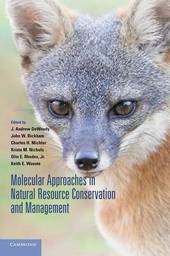
|
Molecular Approaches in Natural Resource Conservation and Management
Hardback
Main Details
Description
Recent advances in molecular genetics and genomics have been embraced by many in natural resource conservation. Today, several major conservation and management journals are now using 'genetics' editors to deal solely with the influx of manuscripts that employ molecular data. The editors have attempted to synthesize some of the major uses of molecular markers in natural resource management in a book targeted not only at scientists but also at individuals actively making conservation and management decisions. To that end, the text features contributors who are major figures in molecular ecology and evolution - many having published books of their own. The aim is to direct and distil the thoughts of these outstanding scientists by compiling compelling case histories in molecular ecology as they apply to natural resource management.
Author Biography
J. Andrew DeWoody did his undergraduate studies in wildlife and fisheries sciences at Texas A&M University. After a brief stint as a field biologist with the now-defunct Soil Conservation Service, he returned to Texas A&M to earn an M.S. in genetics under the tutelage of Drs Rodney Honeycutt and Loren Skow. DeWoody's Ph.D. in zoology is from Texas Tech University, where he worked with Robert Baker. DeWoody then spent three years as a postdoctoral student with John Avise at the University of Georgia in the Department of Genetics. His recent research in genetics, evolution, and ecology has been funded by a variety of organizations, including the National Science Foundation, the USDA-National Research Initiative, the Great Lakes Fishery Trust, the National Geographic Society, and the Joint Transportation Research Program. DeWoody has published more than 65 papers in 35 different scientific journals, and he has served as associate editor for the North American Journal of Fisheries Management, the Journal of Wildlife Management, and Genetica. John W. Bickham is Professor of the Department of Forestry and Natural Resources (FNR) and Director of the Center for the Environment (C4E) at Purdue University. John received his B.S. in biology from the University of Dayton in 1971, his M.S. in biology from the University of Dayton in 1973, and his Ph.D. in zoology from Texas Tech University in 1976. He worked as a faculty member at Texas A&M University in the Department of Wildlife and Fisheries Sciences from 1976 to 2006. He joined the faculty at Purdue in 2006. Dr Bickham has published more than 200 papers in peer-reviewed scientific journals in various areas of evolutionary genetics, including comparative cytogenetics, molecular systematics, molecular ecology, and ecotoxicology. Charles H. Michler is the Fred M. van Eck Director of the Hardwood Tree Improvement and Regeneration Center at Purdue University. In addition, he is site director of the National Science Foundation I/UCRC Center for Advanced Forest Systems. His research interests include forest genetics, in vitro culture, and genetic modification. He earned his B.S. in landscape horticulture and architecture and his M.S. and Ph.D. in horticulture, physiology, and biochemistry from Ohio State University. Dr Michler is also the editor of Plant Breeding Reviews and associate editor of the Journal of Forest Research. Dr Michler has more than 85 scholarly publications, and he has been editor of 9 books and proceedings in his subject area. Krista Nichols is an Assistant Professor in the Departments of Biological Sciences and Forestry and Natural Resources at Purdue University. She received her B.S. in marine science from the University of South Carolina in 1994 and her M.S. in fisheries and wildlife from Michigan State University in 1997. Dr Nichols earned her Ph.D. in zoology from Washington State University in 2002 and was a National Research Council postdoctoral Fellow at the National Marine Fisheries Services, Northwest Fisheries Science Center, until 2005, when she joined the faculty at Purdue. Dr Nichols has published in the fields of ecotoxicology, genetics, and ecology. Her current research interests lie at the intersection of evolution, genetics, physiology, and ecology. Gene Rhodes is a Professor in the Department of Forestry and Natural Resources (FNR) at Purdue University and Director of the Purdue Interdisciplinary Center for Ecological Sustainability. He received his B.S. in biology from Furman University in 1983, his M.S. in wildlife biology from Clemson University 1986, and his Ph.D. in wildlife ecology from Texas Tech University in 1991. Dr Rhodes worked as a Temporary Assistant Research Ecologist at the University of Georgia's Savannah River Ecology Laboratory from 1991 to 1995. He was named a Purdue University Faculty Scholar in 2006; was named the Outstanding Graduate Educator in Forestry and Natural Resources in 2005, 2006, 2008, and 2009; was awarded the Hoosier Wildlife Award by the Indiana Chapter of the Wildlife Society in 2007; and was the recipient of the North Central Section of the Wildlife Society Profession Award of Merit in 2008. He has published more than 135 peer-reviewed scholarly works encompassing a wide variety of topics in ecology and genetics and recently served as an associate editor for the Journal of Wildlife Management. Keith Woeste is a Research Molecular Geneticist for the USDA Forest Service Northern Research Station Hardwood Tree Improvement and Regeneration Center, and an Adjunct Assistant Professor at Purdue University's Department of Forestry and Natural Resources. He received his B.S. in botany in 1980 from the University of Florida and his M.Div. in theology in 1986 from the Jesuit School of Theology at Berkeley. He also earned an M.S. in horticulture in 1990 from the University of California-Davis and a Ph.D. in genetics in 1995 from the University of California, Davis.
Reviews' ... this text could make an excellent compilation for an advanced undergraduate or graduate level course on conservation genetics, as intended. it could be a useful text for a wider audience, who would benefit from reviews of molecular approaches in a variety of sub-disciplines ... the book discusses some extremely interesting and crucial current topics in conservation and management with contributions from an excellent panel of diverse authors.' Ecology
|